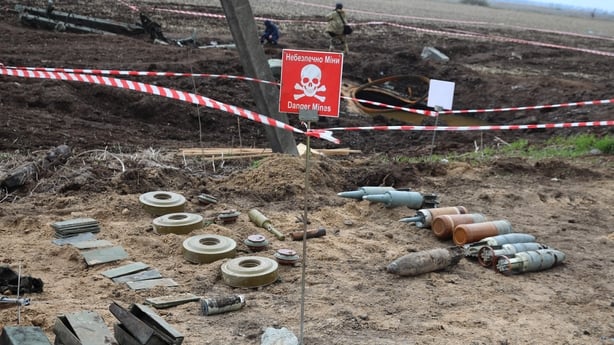Polish Prime Minister Donald Tusk has announced a slew of measures aimed at boosting his country's defence, including large-scale military training for men and a possible exit from a landmark anti-mines treaty.
Poland, a staunch Ukraine ally, has been arming itself heavily in response to actions of neighbouring Russia and amid calls from US President Donald Trump for European countries to take more responsibility for their own defence.
Poland is already far ahead of its allies in terms of military expenditure, aiming to spend 4.7% of its GDP on defence this year - and now it mulls new measures.
"We are facing a very serious race, and it is a race for security," Mr Tusk told the parliament.
"We must be aware that Poland must reach for the most modern possibilities, also related to nuclear weapons and modern unconventional weapons," he said, pledging Poland would use "every available opportunity to increase our defence".

A new military training scheme was intended to be ready by the end of the year "so that every adult man in Poland is trained in case of war," Mr Tusk announced.
The training will turn "those who do not join the army to fully-fledged and valuable soldiers during a conflict," Mr Tusk said, adding the goal was to have a military reserve force "adequate to potential threats".
Mr Tusk, who this week has called on Europe to strengthen its defences to win the "arms race" with Russia, has also backed withdrawing his country from a landmark treaty prohibiting the use of anti-personnel landmines.
"I will recommend a positive opinion for Poland to withdraw from the Ottawa Convention and possibly from the Dublin Convention," Mr Tusk told politicians, referring to treaties on anti-personnel mines and on cluster munitions.
"Let's face it: it's not something nice, nothing pleasant. We know that very well," Mr Tusk said.
"The problem is that in our environment, those we may be afraid of, or those who are at war, they all have it," he added.
Constitutional amendment
Designed to be buried or hidden on the ground, anti-personnel mines often mutilate victims who are not immediately killed and aid groups have decried their long-term impact on civilians.
The Anti-Personnel Landmines Convention, also known as the Ottawa Convention, prohibits the use, stockpiling, production and transfer of landmines.
At least two NATO countries, Finland and Lithuania - both also bordering Russia - have in the past months mulled exiting from the Ottawa Convention.
Lithuania yesterday quit the treaty banning cluster bombs citing security concerns over a threat from Russia, sparking outrage from human rights watchdogs.

Amnesty International called the move "disastrous", while Human Rights Watch said it was "alarming", and the International Committee of the Red Cross warned it "weakens vital protections for civilians".
However, Mr Tusk brushed off a potential backlash.
"We will not look at anyone. We will not fear anyone's criticism," he told the parliament.
Earlier, Polish President Andrzej Duda said he had submitted an amendment to anchor in the constitution a defence spending mark of four percent of GDP, twice NATO's current target.
The amendment would be "a guarantee that these expenses will actually be carried out," Mr Duda told reporters.
Mr Tusk said the proposal should be "analysed very seriously" but did not say if his ruling coalition would back it.
It would need a cross-party support of two-thirds of the politicians in the Polish parliament's lower chamber to enter into force.

